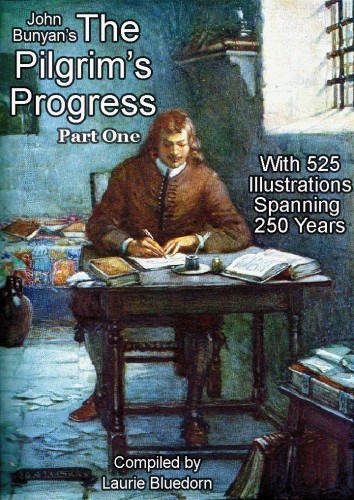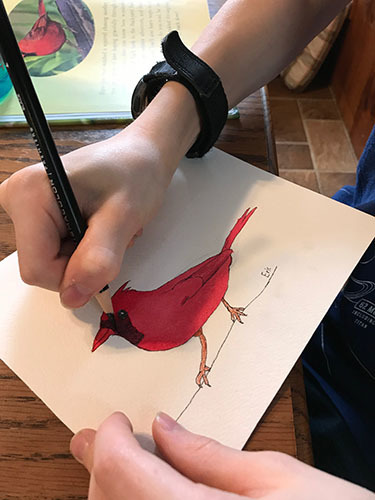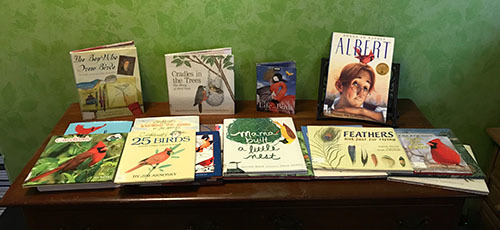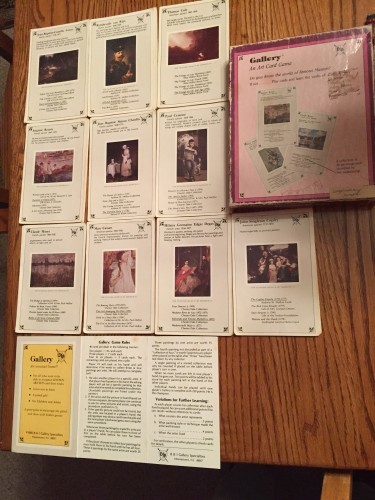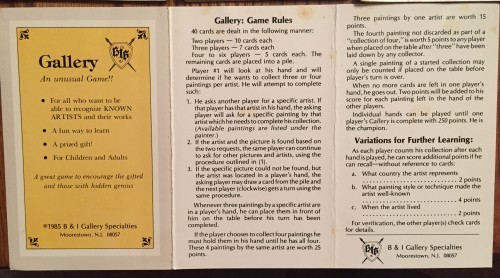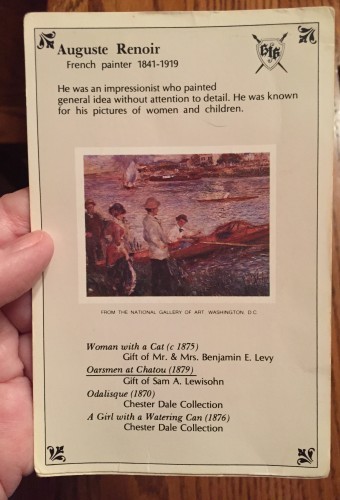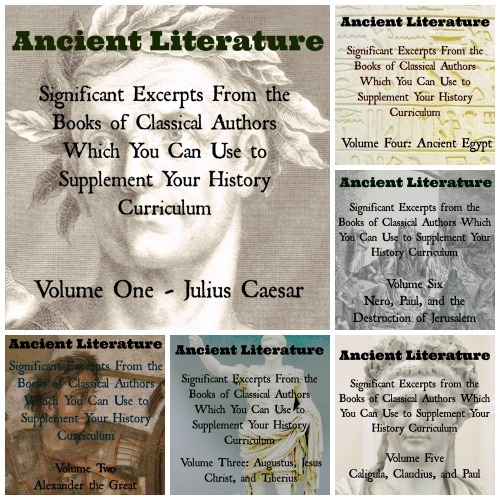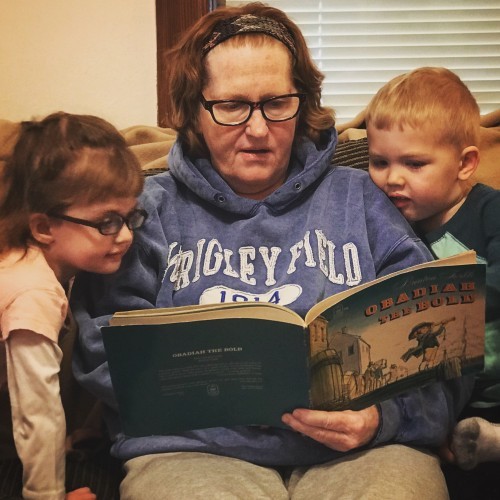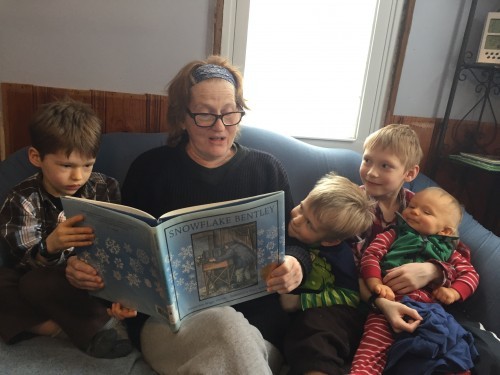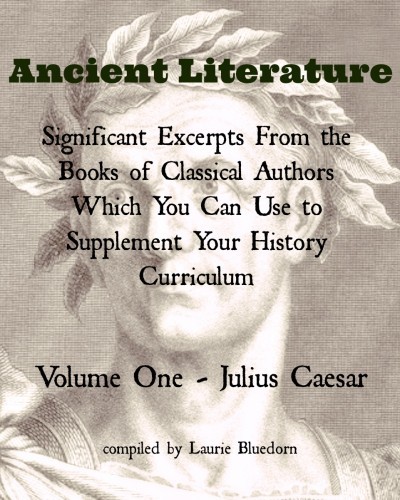Laurie Bluedorn's Blog, page 9
May 16, 2019
Review of Pilgrim’s Progress with 525 Illustrations Spanning 250 Years and Build Your Bundle Sale
Review of our book John Bunyan’s Pilgrim’s Progress Part One with 525 Illustrations Spanning 250 Years
“…As I browsed through one of my favorite stories, I found myself delighted. It seemed that Laurie Bluedorn gathered every picture painted of scenes in Pilgrim’s Progress. …
This copy is a true treasure, like nothing I’ve ever seen before. With 605 pages, you will feel like you are in an art museum devoted to John Bunyan. I was blown away by all the different styles of artwork in the book. I couldn’t stop browsing through the book….”
Read the rest of the review here.
We’re participating again this year in the Build Your Bundle Sale with two of our books — John Bunyan’s Pilgrim’s Progress Part One with 525 Illustrations Spanning 250 Years and Homeschool Self-Study Greek New Testament Reader, Matthew 5-7, Greek Text with English Inter-Phrasal Translation
Both books are included in the Charlotte Mason Inspired Bundle. Products in this bundle include:
Sound Bites: 100 Women Composers Through the Ages from Enrichment Studies
A Night Sky Nature Study from Holistic Homeschooler
Travel God’s World Geography from Powerline Productions
John Bunyan’s The Pilgrim’s Progress Part One from Trivium Pursuit
Charlotte Mason Kindergarten from A Humble Place
Writing Through Early Modern History: Level 1 Print Models from Brookdale House
Timeline Book of Historical Figures and Events from Tied 2 Teaching
Nature Worth Observing from Holistic Homeschooler
Butterfly Nature Study from Holistic Homeschooler
Girls of American History: Josefina from Girls of American History
Greek New Testament Reader from Trivium Pursuit
Early Christian Art from How Great Thou ART
Mystery of History Vol. lll, Quarters 1 & 2 from Mystery of History
The Build Your Bundle Sale lasts for 7 days and it all comes to a close on May 22nd.
May 13, 2019
Hans Bluedorn to give away 7 copies of the audiobook version of Archer and Zowie
Hans Bluedorn is looking to give away seven copies of the audiobook version of Archer and Zowie to families in the US and UK. In exchange, he would like you to review the book on Audible. If you have kids in the 9-13 age range who like science fiction adventures, and audiobooks, send Hans Bluedorn a message at hansbluedorn@gmail.com. Let him know you are interested in a free copy. You will either need to sign up for an account with Audible or have previously purchased audiobooks on Audible or Amazon to apply.
April 29, 2019
Grammy helping with this week’s Five In a Row
What book is daughter Johannah rowing this week with the munchkins? Grammy wants to help.
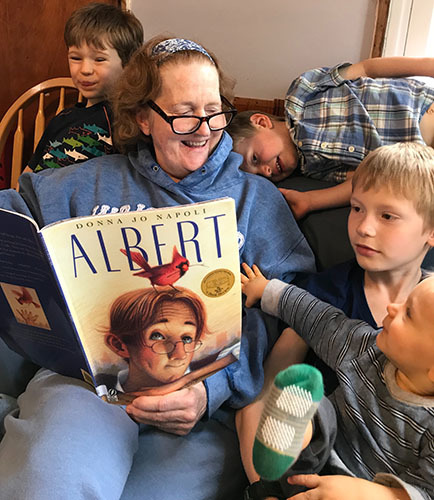
Albert[image error] by Donna Jo Napoli
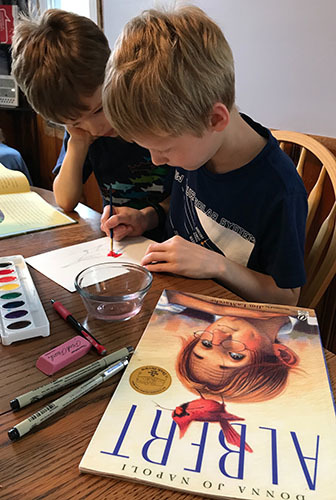
Water color painting lesson with Mom Johannah
April 17, 2019
A diligent pupil in the College of Contentment
by Charles H. Spurgeon
I have learned in whatever state I am, therewith to be content. Philippians 4:11
These words show us that contentment is not a natural propensity of man. Grumbling, discontent, and murmuring are as natural to man as weeds are to the soil. We need not sow thistles and weeds; they come up naturally enough, because they are indigenous to earth. Just so, we need not teach men to complain; they complain fast enough without any education.
“Ill weeds grow quickly.” But the precious things of the earth must be cultivated. If we would have wheat, we must plough and sow; if we want flowers, there must be the garden, and all the gardener’s care.
Now, contentment is one of the flowers of Heaven, and if we would have it, then it must be cultivated, as it will not grow in us by nature. It is the new nature alone which can produce contentment and even then we must be especially careful and watchful, that we maintain and cultivate the grace which God has sown in us.
Paul says, I have learned… to be content; as much as to say, that he did not know how at one time. It cost him some pains to attain to the mastery of that great truth. No doubt he sometimes thought he had learned, and then broke down. And when at last he had attained unto it, and could say, I have learned in whatever state I am, therewith to be content, he was an old, grey-headed man, upon the borders of the grave — a poor prisoner shut up in Nero’s dungeon at Rome.
We might well be willing to endure Paul’s infirmities, and share the cold dungeon with him if we too might by any means attain unto his high degree of contentment. Do not indulge the notion that you can learn contentment without discipline. It is not an ability that may be exercised naturally, but a grace to be acquired gradually. We know this from experience. Brother, hush that murmur, natural though it be and continue a diligent pupil in the College of Contentment.
Gallery — An Art Card Game
Selling my art card game
Gallery: An Art Card Game
–A collection of 40 paintings/cards (10 artists: Carot, Copley, Cezanne, Cassatt, Cole, Degas, Renoir, Monet, Chardin, Rembrandt)
–B&I Gallery Specialties
–published 1985
–fair condition (was played with by my kids for many years)
–wonderful way to learn about art and artists
–Background Notes on artists included
–out of print/very hard to find
–$34 (free U.S. postage)
Call 515-249-3611.
Two years after diagnosis of ovarian cancer — how the Lord has blessed me
I wanted to share this with you.
March 18, 2019
Twelve ancient authors and 44 significant excerpts concerning Alexander the Great including snakes and sea monsters
Ancient Literature: Significant Excerpts from the Books of Classical Authors Which You Can Use to Supplement Your History Curriculum, Volume Two – Alexander the Great
Use primary sources to enhance your study of ancient history.
This 94-page ebook can be used to supplement any ancient history curriculum and is suitable for ages ten through adult. For this volume, we combed through the books of twelve ancient authors to find 44 significant excerpts concerning Alexander the Great. We then arranged the excerpts chronologically and provided the text and citation for each.
Below here we have included only a small portion of the contents of Ancient Literature: Significant Excerpts from the Books of Classical Authors Which You Can Use to Supplement Your History Curriculum, Volume Two – Alexander the Great
Plutarch
The Lives of the Noble Grecians and Romans: Alexander
7.1-3; 8.1-5 Philip hires Aristotle to teach Alexander
7 And since Philip saw that his son’s nature was unyielding and that he resisted compulsion, but was easily led by reasoning into the path of duty, he himself tried to persuade rather than to command him; 2 and because he would not wholly entrust the direction and training of the boy to the ordinary teachers of poetry and the formal studies, feeling that it was a matter of too great importance, and, in the words of Sophocles,
“A task for many bits and rudder-sweeps as well,”
he sent for the most famous and learned of philosophers, Aristotle, and paid him a noble and appropriate tuition-fee. 3 The city of Stageira, that is, of which Aristotle was a native, and which he had himself destroyed, he peopled again, and restored to it those of its citizens who were in exile or slavery.
8 Moreover, in my opinion Alexander’s love of the art of healing was inculcated in him by Aristotle preeminently. For he was not only fond of the theory of medicine, but actually came to the aid of his friends when they were sick, and prescribed for them certain treatments and regimens, as one can gather from his letters. 2 He was also by nature a lover of learning and a lover of reading. And since he thought and called the Iliad a viaticum of the military art, he took with him Aristotle’s recension of the poem, called the Iliad of the Casket, and always kept it lying with his dagger under his pillow, as Onesicritus informs us; 3 and when he could find no other books in the interior of Asia, he ordered Harpalus to send him some. So Harpalus sent him the books of Philistus, a great many of the tragedies of Euripides, Sophocles, and Aeschylus, and the dithyrambic poems of Telestes and Philoxenus. 4 Aristotle he admired at the first, and loved him, as he himself used to say, more than he did his father, for that the one had given him life, but the other had taught him a noble life; later, however, he held him in more or less of suspicion, not to the extent of doing him any harm, but his kindly attentions lacked their former ardour and affection towards him, and this was proof of estrangement. 5 However, that eager yearning for philosophy which was imbedded in his nature and which ever grew with his growth, did not subside from his soul, as is testified by the honour in which he held Anaxarchus, by his gift of fifty talents to Xenocrates, and by the attentions which he so lavishly bestowed upon Dandamis and Calanus.
Diodorus Siculus
Historical Library
17.1-7 How Alexander, having succeeded to the throne, disposed affairs of his kingdom
1.3 Alexander accomplished great things in a short space of time, and by his acumen and courage surpassed in the magnitude of his achievements all kings whose memory is recorded from the beginning of time. 4 In twelve years he conquered no small part of Europe and practically all of Asia, and so acquired a fabulous reputation like that of the heroes and demigods of old. …. 5 On his father’s side Alexander was a descendant of Heracles and on his mother’s he could claim the blood of the Aeacids, so that from his ancestors on both sides he inherited the physical and moral qualities of greatness. …
….6 But, for all the problems and fears that beset his kingdom on every side, Alexander, who had only just reached manhood, brought everything into order impressively and swiftly. Some he won by persuasion and diplomacy, others he frightened into keeping the peace, but some had to be mastered by force and so reduced to submission…..
4 In order to overawe those who refused to yield otherwise, he set out at the head of the army of the Macedonians in full battle array. With forced marches he arrived in Boeotia and encamping near the Cadmeia threw the city of the Thebans into a panic. 5 As the Athenians immediately learned that the king had passed into Boeotia, they too abandoned their previous refusal to take him seriously. So much the rapid moves and energetic action of the young man shook the confidence of those who opposed him. 6 The Athenians, accordingly, voted to bring into the city their property scattered throughout Attica and to look to the repair of their walls, but they also sent envoys to Alexander, asking forgiveness for tardy recognition of his leadership.
7 Even Demosthenes was included among the envoys; he did not, however, go with the others to Alexander, but turned back at Cithaeron and returned to Athens, whether fearful because of the anti-Macedonian course that he had pursued in politics, or merely wishing to leave no ground of complaint to the king of Persia. 8 He was generally believed to have received large sums of money from that source in payment for his efforts to check the Macedonians, and indeed Aeschines is said to have referred to this in a speech when he taunted Demosthenes with his venality: “At the moment, it is true, his extravagance has been glutted by the king’s gold, but even this will not satisfy him; no wealth has ever proved sufficient for a greedy character.” 9 Alexander addressed the Athenian envoys kindly and freed the people from their acute terror.
5.1 Now that we have described what took place in Greece, we shall shift our account to the events in Asia. Here, immediately after the death of Philip, Attalus actually had set his hand to revolt and had agreed with the Athenians to undertake joint action against Alexander, but later he changed his mind. Preserving the letter which had been brought to him from Demosthenes, he sent it off to Alexander and tried by expressions of loyalty to remove from himself any possible suspicion. 2 Hecataeus, however, following the instructions of the king literally, had him killed by treachery, and thereafter the Macedonian forces in Asia were free from any incitement to revolution, Attalus being dead and Parmenion completely devoted to Alexander……
Plutarch
The Lives of the Noble Grecians and Romans: Alexander
6.1-8 Alexander tames Bucephalus
Philonicus the Thessalian brought the horse Bucephalus to Philip, offering to sell him for thirteen talents; but when they went into the field to try him, they found him so very vicious and unmanageable, that he reared up when they endeavoured to mount him, and would not so much as endure the voice of any of Philip’s attendants. Upon which, as they were leading him away as wholly useless and untractable, Alexander, who stood by, said, “What an excellent horse do they lose for want of address and boldness to manage him!” Philip at first took no notice of what he said; but when he heard him repeat the same thing several times, and saw he was much vexed to see the horse sent away, “Do you reproach,” said he to him, “those who are older than yourself, as if you knew more, and were better able to manage him than they?” “I could manage this horse,” replied he, “better than others do.” “And if you do not,” said Philip, “what will you forfeit for your rashness?” “I will pay,” answered Alexander, “the whole price of the horse.” At this the whole company fell a-laughing; and as soon as the wager was settled amongst them, he immediately ran to the horse, and taking hold of the bridle, turned him directly towards the sun, having, it seems, observed that he was disturbed at and afraid of the motion of his own shadow; then letting him go forward a little, still keeping the reins in his hands, and stroking him gently when he found him begin to grow eager and fiery, he let fall his upper garment softly, and with one nimble leap securely mounted him, and when he was seated, by little and little drew in the bridle, and curbed him without either striking or spurring him. Presently, when he found him free from all rebelliousness, and only impatient for the course, he let him go at full speed, inciting him now with a commanding voice, and urging him also with his heel. Philip and his friends looked on at first in silence and anxiety for the result, till seeing him turn at the end of his career, and come back rejoicing and triumphing for what he had performed, they all burst out into acclamations of applause; and his father shedding tears, it is said, for joy, kissed him as he came down from his horse, and in his transport said, “O my son, look thee out a kingdom equal to and worthy of thyself, for Macedonia is too little for thee.”
Josephus
Antiquities of the Jews
11.8.3 Alexander begins the siege of Tyre and asks for provisions from the Jews (333 B.C.)
3. …….So Alexander came into Syria, and took Damascus; and when he had obtained Sidon, he besieged Tyre, when he sent all epistle to the Jewish high priest, to send him some auxiliaries, and to supply his army with provisions; and that what presents he formerly sent to Darius, he would now send to him, and choose the friendship of the Macedonians, and that he should never repent of so doing. But the high priest answered the messengers, that he had given his oath to Darius not to bear arms against him; and he said that he would not transgress this while Darius was in the land of the living. Upon hearing this answer, Alexander was very angry; and though he determined not to leave Tyre, which was just ready to be taken, yet as soon as he had taken it, he threatened that he would make an expedition against the Jewish high priest, and through him teach all men to whom they must keep their oaths. So when he had, with a good deal of pains during the siege, taken Tyre, and had settled its affairs, he came to the city of Gaza, and besieged both the city and him that was governor of the garrison, whose name was Babemeses.
Quintus Curtius
History of Alexander
4.4.1-5 Sea Monster found at Tyre
At this point Alexander from utter weariness had determined to raise the siege and go to Egypt. For after he had overrun Asia with great speed he was lingering around the walls of a single city, thus losing the opportunity for so many mighty exploits. But he was as much ashamed to withdraw baffled, as to delay, thinking that his reputation also, by which he had overthrown more than by his arms, would be impaired if he should leave Tyre as a witness that he could be defeated. Therefore, in order to leave nothing untried, he ordered more ships to be brought up and the best of his soldiers to be embarked upon them. And it chanced that a sea-monster, of a size never before seen, rising even above the waves with its back, brought its huge body up to the causeway which the Macedonians had built, and striking the surges asunder as it lifted itself, was seen by both sides. Then from the peak of the causeway it again plunged under the sea, and now rising above the surface with a great part of its bulk, now hidden as the waves dashed over it, it disappeared under water not far from the walls of the city. The appearance of the monster gave joy to both sides; the Macedonians interpreted it as showing the direction in which to go on building up the work; the Tyrians thought that Neptune, as an avenger of the usurped sea, had brought the monster against the causeway, and that it would surely soon fall in ruins.
Daniel
Bible
8.5-7 Daniel foretells of Alexander the Great
5 And as I was considering, suddenly a male goat came from the west, across the surface of the whole earth, without touching the ground; and the goat had a notable horn between his eyes. 6 Then he came to the ram that had two horns, which I had seen standing beside the river, and ran at him with furious power. 7 And I saw him confronting the ram; he was moved with rage against him, attacked the ram, and broke his two horns. There was no power in the ram to withstand him, but he cast him down to the ground and trampled him; and there was no one that could deliver the ram from his hand.
Strabo
Ancient Geography
15.1.28 Snakes found in India
28 Between the Indus and the Hydaspes is Taxila, a large city, and governed by good laws. The neighbouring country is crowded with inhabitants and very fertile, and here unites with the plains. The people and their king Taxiles received Alexander with kindness, and obtained in return more presents than they had offered to Alexander; so that the Macedonians became jealous, and observed, that it seemed as if Alexander had found none on whom he could confer favours before he passed the Indus. Some writers say that this country is larger than Egypt. Above this country among the mountains is the territory of Abisarus, who, as the ambassadors that came from him reported, kept two serpents, one of 80, and the other, according to Onesicritus, of 140 cubits in length. This writer may as well be called the master fabulist as the master pilot of Alexander. For all those who accompanied Alexander preferred the marvellous to the true, but this writer seems to have surpassed all in his description of prodigies. Some things, however, he relates which are probable and worthy of record, and will not be passed over in silence even by one who does not believe their correctness. Other writers also mention the hunting of serpents in the Emodi mountains, and the keeping and feeding of them in caves.
Diodorus Siculus
Historical Library
17.89.1-6; 17.90.1, 4-7 Snakes found in India
89. Many were slain in their flight, but then Alexander, satisfied with his brilliant victory, ordered the trumpets to sound the recall. Of the Indians, there fell in the battle more than twelve thousand, among whom were the two sons of Porus and his best generals and officers. Above nine thousand men were taken alive, together with eighty elephants. Porus himself was still breathing, and was turned over to the Indians for medical attention. On the Macedonian side, the losses were two hundred and eighty cavalry and more than seven hundred infantry. The king buried the dead, rewarded those who had distinguished themselves in accordance with their deserts, and sacrificed to Helius who had given him the eastern regions to conquer. There were mountains not far away where grew thriving firs in quantity, together with no little cedar and pine and an ample supply of other woods suitable for shipbuilding, and Alexander constructed a large number of ships. He intended to reach the borders of India and to subdue all of its inhabitants, and then to sail downstream to the Ocean. He founded two cities, one beyond the river where he had crossed and the other on the spot where he had defeated Porus. These were built quickly because there was a plentiful supply of labour. When Porus had recovered, Alexander appointed him, in recognition of his valour, king over the country where he formerly ruled. The Macedonian army rested for thirty days in the midst of a vast plenty of provisions.
90. Odd phenomena were observed in these mountains. In addition to the wood for shipbuilding, the region contained a large number of snakes remarkable for their size; they reached a length of sixteen cubits…..Sasibisares, the king who had not moved in time to help Porus in the battle, was frightened, and Alexander forced him to accept his orders. Then Alexander resumed his march to the east, crossed the river, and continued on through a region of remarkable fertility. It possessed strange kinds of trees which reached a height of seventy cubits, were so thick that they could scarcely be embraced by four men, and cast a shadow of three plethra. This country possessed a multitude of snakes, small and variously coloured. Some of them looked like bronze rods, others had thick, shaggy crests, and their bites brought sudden death. The person bitten suffered fearful pains and was covered with a bloody sweat. The Macedonians, who were much affected by the bites, slung their hammocks from trees and remained awake most of the night. Later, however, they learned from the natives the use of a medicinal root and were freed from these fears.
Entire contents of this ebook:
Claudius Aelianus — NAME OF AUTHOR
Various History — TITLE OF BOOK
Aelianus mistakenly reports that Alexander was born and died on same day of month — DESCRIPTION OF SIGNIFICANT EXCERPT
Plutarch
The Lives of the Noble Grecians and Romans: Alexander
Alexander born on the sixth day of the month — Hecatombaeon
Aulus Gellius
Attic Nights
A letter of Philip to Aristotle with regard to the recent birth of his son Alexander
Plutarch
The Lives of the Noble Grecians and Romans: Alexander
Alexander tames Bucephalus
Plutarch
The Lives of the Noble Grecians and Romans: Alexander
Philip hires Aristotle to teach Alexander
Justin
Epitome of Pompeius Trogus
Commencement of Alexander’s reign; he prepares to invade Persia
Diodorus Siculus
Historical Library
How Alexander, having succeeded to the throne, disposed affairs of his kingdom
Diodorus Siculus
Historical Library
Alexander destroys Thebes (335 B.C.)
Claudius Aelianus
Various History
Alexander destroys all in Thebes except the houses of the priests and of Pinder
Arrian
Anabasis of Alexander
Alexander crosses over to Asia (334 B.C.)
Arrian
Anabasis of Alexander
Alexander defeats the Persians in the Battle of Granicus (334 B.C.)
Plutarch
The Lives of the Noble Grcians and Romans: Alexander
Plutarch’s version of the Battle of Granicus
Diodorus Siculus
Historical Library
Alexander proclaims liberty to all the Greek cities
Arrian
Anabasis of Alexander
Alexander defeats Darius in the Battle of Issus (333 B.C.)
Josephus
Antiquities of the Jews
Alexander begins the siege of Tyre and asks for provisions from the Jews (333 B.C.)
Arrian
Anabasis of Alexander
Siege of Tyre
Quintus Curtius
History of Alexander
Sea monster found at Tyre
Quintus Curtius
History of Alexander
The fall of Tyre
Isaiah
Bible
The prophet Isaiah foretells the final destruction of Tyre by Alexander the Great
Justin
Epitome of Pompeius Trogus
Darius offer Alexander a deal
Arrian
Anabasis of Alexander
Alexander takes Gaza (332 B.C.)
Josephus
Antiquities of the Jews
Alexander enters Jerusalem in peace
Arrian
Anabasis of Alexander
The founding of Alexandria by Alexander (332 B.C.)
Plutarch
The Lives of the Noble Grecians and Romans: Alexander
Battle of Gaugamela (331 B.C.)
Arrian
Anabasis of Alexander
Battle of Gaugamela
Plutarch
The Lives of the Noble Grecians and Romans: Alexander
Darius escapes
Diodorus Siculus
Historical Library
Alexander conquers Babylon and Susa
Quintus Curtius
History of Alexander
Alexander enters Babylon
Plutarch
The Lives of the Noble Grecians and Romans: Alexander
Alexander amazed by a chasm in the earth in Batana
Diodorus Siculus
Historical Library
Alexander destroys Persepolis (331 B.C.)
Diodorus Siculus
Historical Library
Death of Darius (330 B.c.)
Daniel
Bible
Daniel foretells of Alexander the Great
Arrian
Anabasis of Alexander
Alexander enters India; How Alexander constructed his bridge over the river Indus (327 B.C.)
Strabo
Ancient Geography
Snakes found in India
Quintus Curtius
History of Alexander
Description of India
Diodorus Siculus
Historical Library
Snakes found in India
Aulus Gellius
Attic Nights
About the horse of King Alexander, called Bucephalas
Arrian
Anabasis of Alexander
Death of Alexander’s horse Bucephalas (327 B.C.)
Pliny the Elder
Natural History
The Indian fig
Arrian
Anabasis of Alexander
Alexander wounded
Arrian
Anabasis of Alexander
March through Gadrosia (326 B.C.)
Arrian
Anabasis of Alexander
Alexander in Persis; tomb of Cyrus repaired
Arrian
Anabasis of Alexander
Death of Alexander the Great (323 B.C.)
Quintus Curtius
History of Alexander
Events immediately after Alexander’s death
March 11, 2019
Favorite audio books in our family
My grands spend a good amount of time listening to audio books. Here are their favorites.
Eric (9yo), Michael (6yo), and Ian (3yo) like:
Winnie-the-Pooh: A.A. Milne’s Pooh Classics
[image error]
My Father’s Dragon
[image error]
The Trumpet of the Swan
[image error]
Mr. Popper’s Penguins
[image error]
Rudyard Kipling’s The Jungle Book
[image error]
The Story of Doctor Dolittle
[image error]
Thornton W. Burgess stories about animals
Eric (9yo) and Michael (6yo) like:
A Bear Called Paddington[image error]
Alice in Wonderland[image error]
The Treasure Seekers[image error]
The Wouldbegoods[image error]
Little House in the Big Woods[image error] series by Laura Ingalls Wilder
The Wind in the Willows[image error]
What Katy Did
Understood Betsy
The Borrowers[image error]
Swallows and Amazons[image error] series
Penrod series
Just William series
Eric (9yo) likes:
Black Beauty
Ginger Pye
[image error]
Otto of the Silver Hand
Swiss Family Robinson
Five Little Peppers and How They Grew
The Winged Watchman
[image error]
Are you looking for a way to include primary sources into your history lessons?
Add value to your history curriculum — Julius Caesar free on Kindle for 3 days
Are you looking for a way to include primary sources into your history lessons?
Ancient Literature — Significant Excerpts From the Books of Classical Authors Which You Can Use to Supplement Your History Curriculum
Volume One — Julius Caesar
Volume Two — Alexander the Great
Volume Three — Augustus, Jesus Christ, and Tiberius
Volume Four — Ancient Egypt
Volume Five — Caligula, Claudius, and Paul
Volume Six — Nero, Paul, and the Destruction of Jerusalem
The six ebooks (over 800 pages) can be purchased on Amazon Kindle for $2.99 each….
….but, for three days (March 12-14), Volume One Julius Caesar is free.
In addition, if you write an Amazon review of Volume One Julius Caesar, we’ll send you Volumes Two, Three, Four, Five, and Six — free!
Use primary sources to enhance your study of history.
These ebooks can be used to supplement any ancient history curriculum and are suitable for ages ten through adult. We combed through the books of dozens of ancient authors to find significant excerpts concerning the different time periods. We then arranged the excerpts chronologically and provided the text and citation for each.
Download your free copy of Volume One — Julius Caesar here.
Buy Volume Two — Alexander the Great here.
Buy Volume Three — Augustus, Jesus Christ, and Tiberius here.
Buy Volume Four — Ancient Egypt here.
Buy Volume Five — Caligula, Claudius, and Paul here.
Buy Volume Six — Nero, Paul, and the Destruction of Jerusalem here.
You can purchase the PDF version of these ebooks here.
Let us know if you write an Amazon review of Volume One and we’ll send you the rest of the volumes (bluedorn@triviumpursuit.com).
March 9, 2019
Best book on counseling
[image error]
[image error]
Your Family, God’s Way: Developing and Sustaining Relationships in the Home
[image error]
What makes a good family? Good theology, regular family worship, separation from the world, modest dressing, listening to good music, going to a Biblical church, homeschooling? All of these things may be good, but none of them, by themselves, are what make a good family.
A good family is one where there are arguments — even heated arguments, there are happy times and there are sad times, there are financial troubles and medical troubles, there are lots of days with at least one person falling on the floor giving way to a big belly laugh, there is hard work and there is relaxation, there is discouragement and hope, there is boredom and anticipation, there is sadness and there is joy. Most good families even have to go through serious trials and hardships. But most of all, a good family is one where the members have two very necessary tools:
1. they know how to communicate properly with one another, and,
2. they know how to resolve conflicts.
They can get mad at each other, but not sin (Ephesians 4:26). They know how to confront, but in the right way (Ephesians 4:15; Romans 15:14). They know how to affirm and encourage (Philemon 4-7; Hebrews 3:12-13), and not just flatter (Proverbs 29:5). They know how to love (Galatians 5:13; Ephesians 4:2; Romans 12:9) and how to forgive (Luke 17:3-4; Colossians 3:12-13). They know the difference between being self-focused and others-focused (I Corinthians 10:24; Philippians 2:4; I Thessalonians 5:14-15), and, lastly, but most importantly, they know how to pursue peace (Hebrews 12:14-15; Titus 3:1-7).
Unless you are one of the very blessed and had two parents who knew all this stuff and gave you these two tools, you’ll have to acquire them yourself. Don’t expect to absorb this knowledge through the skin by listening to seminars or have it miraculously flow into your brain by the laying on of hands or be given it on a silver platter. If you’re like most of us, you’ll have to work at it.
It’s a two-step process.
Step One: Realize you don’t have these two tools and that you need to get them
Step Two: Get them
Many people never get to Step One. It’s pretty much all God that gets a person through Step One. You can’t lecture, force, manipulate, or convince a person through that step.
I’ve read a lot of counseling books over the years, starting back in the early 70’s when I was in college. There are the solid counseling books:
Addictions: A Banquet in the Grave: Finding Hope in the Power of the Gospel[image error] by Edward Welch
Anger Management[image error] by Richard Baxter
Anger: Escaping the Maze[image error] by David Powlison
Breaking the Addictive Cycle: Deadly Obsessions or Simple Pleasures[image error] by David Powlison
The Exemplary Husband: A Biblical Perspective[image error] by Stuart Scott
Grief: Finding Hope Again[image error] by Paul David Tripp
Blame It on the Brain: Distinguishing Chemical Imbalances, Brain Disorders, and Disobedience[image error] by Edward T. Welch
When People Are Big and God is Small: Overcoming Peer Pressure, Codependency, and the Fear of Man[image error] by Edward Welch
Communication and Conflict Resolution: A Biblical Perspective[image error] by Stuart Scott
Depression: Looking Up from the Stubborn Darkness[image error] by Edward T. Welch
Facing Grief: Counsel For Mourners[image error] by John Flavel
Spiritual Depression: Its Causes and Its Cure[image error] by Dr. D. Martyn Lloyd-Jones
Triumphing Over Sinful Fear[image error] by John Flavel
and then there are the fad counseling books.
The solid, foundational counseling books are ones you need to buy and keep in your library.
Your Family, God’s Way: Developing and Sustaining Relationships in the Home[image error] is one you’ll need to buy.
Part One of Your Family God’s Way lays the groundwork and discusses men, women, and children’s roles in the home — but that’s just a small part of this book. We all know what the IDEAL husband, wife, and child should look like. It’s the getting there that’s so difficult.
Part Two of Your Family God’s Way deals with that first necessary tool: communication.
Topics covered include types of communication abnormalities that people have, hindrances to communication, and because this book is heavy on the application part, what you can do about these problems. Sometimes, reading about a particular communication abnormality will help a person get through Step One.
Nonverbal communication
“…we’re constantly sending out messages without even opening our mouths.” page 57
“If I avoid eye contact with you, I’m communicating.” page 57
“Never underestimate the significance of your nonverbal behavior.” page 60
“…nonverbal communication is often misunderstood.” page 62
“Learn…the need to see how others may read your nonverbal behavior. Insofar as it is possible, make sure that your nonverbal behavior communicates to others what you want to communicate, what you are actually thinking and feeling.” page 70
“Explaining the meaning of your nonverbal behavior to others is an essential part of effective communication.” page 72
“…be cautious in our interpretation of another person’s actions.” page 73
Undertalk
“In some instances ‘undertalk’ is manifested by topic avoidance.” page 81
“‘Small talk’ sometimes is disguised in the form of apathetic talk.” page 82
“Deficient sharing prevents intimacy and hinders efforts to build your family God’s way.” page 83
“Acknowledgment deficit may occur during family discussions when one member makes a contribution, but no one else pays any attention.” page 83
“No Christian family that takes God and His Word seriously should allow ‘undertalk’ in the form of a lack of commendation to rule the day.” page 84
“Selfishness, stubbornness, and a desire to punish are the roots of ‘small talk’s’ power in other families.” page 85
“People hesitate to speak freely because they fear that others may use what they say against them.” page 86
Overtalk
“…certain people have a propensity to dominate conversations.” page 99
“…defensiveness and excuse making are frequently practiced in families today.” page 101
“Takeover speech also qualifies as ‘overtalk.’” page 102
“Certain non-stop or motor-mouth speech is a kind of ‘overtalk.’” page 102
“‘Overtalk’ may take the form of badgering others…” page 103
“An abundance of self-centered speech is a common type of “overtalk.’” page 104
Circuit jammers to communication
“The Bible indicates that all of us practice lying.” page 115
“Exaggeration is a more subtle, but equally lethal form of lying.” page 116
“When people fear they will be misrepresented, they avoid discussing issues on which they don’t want to be misquoted.” page 119
Sidetracking “happens when, in the course of conversation, no one issue is thoroughly discussed.” page 119
“Hurling harsh and cutting words at family members will surely distance them from you, both spatially and emotionally.” page 121
“Scripture encourages us to become experts at the ‘dribble’ technique. Dribbling soft, gentle, respectful words to people will draw them closer to you.” page 121
“Cancellation speech…occurs when something is said in one breath and taken back (cancelled) with the next.” page 122
“Cancellation speech often manifests pride intent on exalting self by keeping others in their place — a lower place.” page 122
“Ventriloquistic speech takes over for the other person.” page 124
“Some speakers project the attitude that once they have spoken on a subject, nothing more can be added; the ultimate has been spoken.” page 124
“Some people constantly complain and find fault.” page 125
Part Three of Your Family God’s Way looks at the second necessary tool: conflict resolution.
“R.T. Archibald noted that ‘peacemakers…carry about with them an atmosphere in which quarrels die a natural death.’” This statement is really at the heart of Your Family God’s Way, and Wayne Mack gives some practical ideas on how you can become the peacemaker in your family.
Your Family God’s Way allows for self-examination through the extensive list of exercises at the end of each chapter. In these exercises you will be evaluating yourself and your family in the light of the truths found throughout each chapter, plus you’ll find practical guidelines for implementing these truths.
With knowledge comes power. This book gives you the knowledge and thereby the power to transform your family from one of pride, complacency, apathy, and status-quo. This book gives hope, but expect to work. Expect painful work.
Read Your Family God’s Way together as a family and do the homework at the end of each chapter. I guarantee it will benefit your family in a thousand ways. Do it now, while your family is young.

